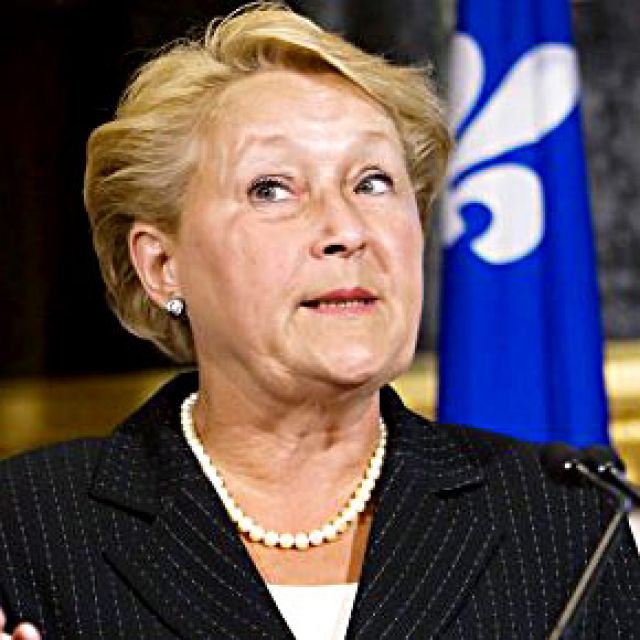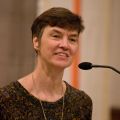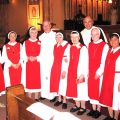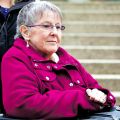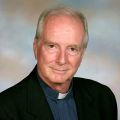News/Canada
Quebec's Charter of Secularism would push religious believers out of public square
By Deborah Gyapong, Canadian Catholic NewsOTTAWA - A religious freedom expert warns the Parti Quebecois leader's proposed Charter of Secularism should the PQ win Quebec's provincial election Sept. 4 would violate the Charter and push many religious believers out of public service.
"Religions in Quebec have rights and one of these rights is not to be forced out of the public sphere by the beliefs of atheism and agnosticism dominating the public," said Iain Benson, a constitutional lawyer and international religious freedom expert.
Benson said he was "startled" by PQ Leader Pauline Marois' proposed Charter of Secularism that would prohibit government employees from wearing religious symbols such as hijabs, kirpans (ceremonial daggers required by baptized Sikhs), turbans and kippahs (or yarmulke, the skullcap worn by Jewish men). It would allow the wearing of an unobtrusive crucifix. Marois' Charter later clarified the crucifix in the National Assembly could also remain because it is part of Quebec's heritage, explaining moves towards ensuring state neutrality do not mean Quebeckers have to deny who they are.
"It would mean that only those who do not have an orthodox traditional view of their religious tradition could work in a public sphere setting while maintaining their beliefs about religious garb and that doesn't seem fair," Benson said. "We just need to get over the secularist prejudice that only religious people believe things. Everyone is a believer and not wearing religious symbols is an indication what one does not believe as much as wearing them indicates what one does."
Marois is not alone in her support for the crucifix or other Christian symbols as a nod to Quebec's past. Other leaders also chimed in to support it, including Liberal Leader and Premier Jean Charest.
Previously the Quebec National Assembly voted unanimously to keep the crucifix over the Speaker's chair despite recommendations it be removed by the Bouchard-Taylor Commission that investigated religious accommodation in the province.
Quebec's Catholic bishops will not be weighing in on the election, if at all, until later in September. The Quebec bishops have the matter on the agenda for their upcoming meeting, said a spokesman for the Assembly of Catholic Bishop of Quebec and no statement will be coming out before then. Assembly president Archbishop Paul-Andre Fournier has issued a pastoral letter urging Catholics to exercise their right to vote and to reflect seriously on the issues in light of Gospel values.
"The Catholic bishops have a difficult time in Quebec owing to historical over-reach by certain Catholics in the past when the Church was so dominant," said Benson. "This has left a very deep and lingering resentment in that province."
Benson urged religious leaders of all faiths, however, to be more vocal in defense of religious freedom and critical of secularism as "an anti-religious ideology."
"Quebec seems confused about the fact that the better understanding of 'secular' or 'public' is that it is or ought to be inclusive of all citizens, religious or non-religious," he said.
Benson said this confusion over definitions means that the anti-religious secularism comes up in the middle of the confusion and takes over.
History has shown iconoclasts have always tried to tear down the religious relics of previous eras, and the importance to cultures of various symbols will come and go, he said.
"The attempt by contemporary secularists in Quebec to keep religious icons emptied of their significance may be seen for what it is — a vain attempt to believe the crucifix empty of its deeper meanings just because they themselves don't believe them," he said.
Benson, who divides his time between France and Canada, notes Quebec seems to be following the policy of laicism in France where religious symbols are banned from the public service.
He does support bans on partial or full face-coverings for those dealing with the public or receiving public services.
"Where we are involved in working in the public sphere I believe all citizens have a right to see the face of other citizens," he said. "They don't have the right to demand that a person remove a turban or headscarf or yarmulke or cross but they can demand that they can see who they are dealing with."
Chimney swifts a 'beautiful aspect' of King's University campus
By Erin Morawetz, The Catholic RegisterKing’s University College in London, Ont., has made a conscious effort to go green — and even the birds have noticed.
The Catholic college has incorporated the environment into its mandate and implemented many green initiatives, which range from solar panels to a volunteer “Green team” that organizes campus cleanups and tree planting.
But being a bird sanctuary? That wasn’t planned.
The large chimney attached to the Wemple Building at King’s is home to some 300 swifts every August and September, said King’s principal David Sylvester. Far from being a nuisance, Sylvester said the small, robin-sized birds have become a “beautiful aspect of the King’s campus.”
“On any given night in the summer here you can see the swifts returning to the chimney,” Sylvester said. “It’s like smoke coming in and out.”
That number has now grown. Three at-risk chimney swift birds, who have been in constant care since mid-July, were released into the wild at King’s Aug. 15. The birds were roosting in a chimney in a home in Aylmer, Ont., when their home fell into a furnace pipe. Swift Care Ontario, a London-based, newly certified wildlife rehabilitation charity, nursed them back to health by providing hourly feedings, vitamin and mineral supplements and housing in an artificial chimney. By Aug. 15, they were ready to go.
Debbie Lefebre, co-founder of Swift Care Ontario, said while there’s bound to be population loss with the release of swifts, many do survive — and each life matters.
“If we can save even one or two of them, put back into the wild population, that’s a bonus,” Lefebre said. “Every creature deserves to have its place in the web (of life).”
The number of swifts that flock to King’s each summer may be increasing, but the overall population of these birds has decreased by more than 95 per cent in the last 40 years. Luckily, there are not three more swifts being added to that statistic.
Sylvester said King’s being a home for so many swifts — and the location of the release of these now-healthy ones — suits King’s mission.
“It fits perfectly within our whole stewardship of the environment and our call as a Catholic college, (our) relationship to creation and the environment,” he said.
“It’s not like we made a conscious decision (to house them). They chose us. I would say we're lucky that the swifts chose us and we’ve just kept up our part of the bargain.”
O’Gara fostered dialogue among Christians
By Catholic Register StaffOne of Canada's most eminent theologians and one of the greatest Catholic experts in ecumenism has died.
Margaret O’Gara, Professor of Theology at the University of St. Michael’s College, entered the realm of eternal life on Thursday, August 16, at age 65. She had suffered from cancer for two years.
In 37 years of work as a theologian O'Gara was able to foster dialogue among Christians for the sake of overcoming divisions between the churches. Besides her teaching, research, writing, and extensive public lecturing, she was a member of official ecumenical dialogues in Canada, the United States, and at the international level. She served terms as president of both the North American Academy of Ecumenists and the Catholic Theological Society of America.
O'Gara's effectiveness came from a combination of her scholarly rigor, exceptional ability to listen sympathetically, uncommon energy, and contagious delight at the growth of mutual understanding and friendship. The same traits marked her strong personal relationships with her students and colleagues, the members of her extended family, and her many longstanding friends. The fundamental driving force of her life was her deep and abiding Christian faith.
Visitation at Rosar-Morrison Funeral Home, 467 Sherbourne Street, on Wednesday, August 22, from 2:00 to 9:00 p.m., with a prayer service at 7:30 p.m. Funeral mass at St. Basil’s Church on Thursday, August 23, at 10:30 a.m. Burial in Breckenridge, Minnesota.
Precious Blood Sisters time in Charlottetown comes to an end
By Doreen Beagan, Catholic Register SpecialCHARLOTTETOWN, P.E.I. - After 83 years, the Sisters of the Precious Blood have bid adieu to Charlottetown.
A farewell Mass and reception was held Aug. 15, the Feast of the Assumption, at St. Dunstan’s Basilica in Charlottetown to honour the Sisters of the Precious Blood as they close their monastery and the remaining Sisters move on to other parts of Canada. The basilica was filled to capacity, and under the direction of Leo Marchildon, a massed choir sang Marian hymns appropriate to the feast.
Declining numbers and a lack of new vocations were cited for the end to the Sisters presence in Charlottetown, a presence dating back to 1929.
The Precious Blood Sisters, in a statement, said, "We are deeply grateful for the 83 years during which we have carried you and your parents and grandparents in our hearts and held your needs up to the Lord. We are saying farewell, but this is not an ending. Prayer is not bound by time or space or geography. And though we will no longer have a presence in Charlottetown, we will still hold you in our hearts and lift your needs up to the Lord. We will not abandon you. You are etched in our hearts forever."
Charlottetown Bishop Richard Grecco told the audience that the Sisters will be greatly missed in the diocese.
"We shall miss dearly the prayerful touch with which you reached out to so many individuals and groups," said Grecco. "We are grateful that God called you to the religious life, and sent you to us for 83 years. Now as God sends you elsewhere, we ask you to keep us in your prayers, as we will all of you."
Pro-life Crossroads walkers are convinced tide is turning
By Deborah Gyapong, Canadian Catholic NewsOTTAWA - Twelve Crossroads walkers who hiked through Canada for the past three months wearing "Pro-Life" t-shirts ended their trek in Canada's capital convinced public opinion is turning against abortion.
"We have such a great country," said Patrick Wilson, 21, the leader of the Canadian Crossroads group that ended its cross-country trek Aug. 11. "We had a lot of positive support. I think the tide's turning."
"There was so much encouragement in the most unexpected places," said Lindsay Richey, 20, of Armstrong, B.C. "People that we expected would be angry or aggressive ended up being pro-life."
Richey said at one point a man driving his car past them on the highway turned around to come alongside them again to tell us "how proud he was to see people of his generation standing up for pro-life."
"It inspired him and made him happy," she said.
And in Winnipeg, a man driving a souped-up sports car pulled up near the group at a stoplight and asked Wilson what the group was doing. "Why are you pro-life and not pro-choice?" he asked.
"He looked like a complete dude," Wilson said. "I just liked his car."
But then the man stunned him by saying, "I'm adopted and if it wasn't for people like you I wouldn't be there today."
"He was just so touched," Wilson said. "This came at a time when we were encountering a lot of opposition."
Wilson said these hopeful signs would happen just when the walkers were feeling a little discouraged and wondering if they were doing any good.
The opposition they encountered included "a lot of middle fingers flashed at us, long glances and people yelling at us to go home," but what Wilson said bothered him the most was apathy.
"I'd almost prefer people take a stand, stand for something instead of living in la la land, with no sense of morality, and have no reaction at all."
For Richey, her most discouraging moment came inside a Catholic Church in Toronto when a parishioner told her he was pro-choice and didn't like what she was doing. She asked how he could be pro-choice and Catholic at the same time. "I'm a realist," was his response.
"It was very challenging, but at the same time so fulfilling," Richey said. "I could offer up all the hardship and difficulties for the cause of pro-life."
The Ottawa pro-life community welcomed the walkers.
"We're proud of you," Wanda Hartlin, Campaign Life Coalition communications co-ordinator, told the walkers upon their arrival on Parliament Hill.
Pro-life activist Frank Barrett presented each of the walkers with a certificate of appreciation from Conservative MP Pierre Lemieux, a pro-life MP who was unable to attend in person.
Crossroads groups began their walks in the mid-1990s. The Canadian group was one of five that began walks on May 13, leaving from Vancouver.
Assisted suicide exemption creates "exception to murder"
By Deborah Gyapong, Canadian Catholic NewsOTTAWA - Groups opposing euthanasia have expressed alarm over a B.C. judge's recent ruling that allows Gloria Taylor, a B.C. woman dying of a degenerative nerve disorder, a constitutional exemption to an assisted suicide should her symptoms worsen in the next year.
Taylor, one of the plaintiffs in the controversial Carter case decided last June, had been granted the exemption when B.C. Supreme Court Justice Lynn Smith struck down Canada's laws against assisted suicide and euthanasia as unconstitutional on Charter grounds. Smith ruled the laws would be kept in force for a year so Parliament can react with new legislation, but allowed Taylor the exemption while the law is still in force.
In July, the federal government appealed the Carter decision, including the constitutional exemption.
On Aug. 10, B.C. Justice Jo-Ann Prowse, however, ruled removing the exemption would cause Taylor "irreparable harm" by taking away the solace and peace of mind of knowing she could obtain an assisted suicide and by removing her ability to have one before her symptoms became unbearable.
"The suggestion that denying Ms. Taylor the exemption would have caused her irreparable harm is absurd," said Catholic Organization for Life and Family (COLF) assistant director Peter Murphy. "Surely to kill or to facilitate killing is to do irreparable harm.
"Do we really want to live in country where individual judges hold the keys to life and death?" he asked. "The value of human life can never be measured by some subjective notion of its quality."
Euthanasia Prevention Coalition (EPC) executive director Alex Schadenberg questioned whether judges were "overstepping" their bounds. He pointed out the Supreme Court of Canada upheld Parliament's laws against euthanasia and assisted suicide in the 1993 Rodriguez case. Sue Rodriguez, who also had ALS or Lou Gehrig's disease, found an anonymous doctor who helped her end her life in 1994.
"It appears to me that judges are trying to make decisions that fit what they want rather than the law and judicial precedence," Schadenberg said. "They're writing their laws, their own script, and it's very concerning to me."
The Carter decision will be argued before the B.C. Court of Appeal March 4-8, 2013 and many have argued the constitutional exemption is an exception only for Taylor. But Schadenberg pointed out that others may seek exemptions under the principle of equality before the law.
"Other people who fit the criteria would have to be taken seriously," he said, noting he expected lawyers in the Ginette LeBlanc case to be argued in Quebec this December to ask for one. LeBlanc also suffers from ALS.
"Technically, the law has not changed. Euthanasia and assisted suicide are still completely illegal. Rodriquez is still upheld," Schadenberg said.
"But a judge is saying it is okay in this circumstance, the laws do not apply. It's not about Parliament, not about the Supreme Court, it's about a single judge. We're putting the power of life and death in the hands of a judge or a doctor."
Schadenberg said the federal Attorney General can appeal this latest ruling on the constitutional exemption and urged Canadians to let Justice Minister Rob Nicholson know they want him to do so.
Schadenberg said that assisted suicide is the intentional killing of a human being.
"That's homicide," he said. "We are creating an exception to murder."
New work the age-old story of redemption
By Michael Swan, The Catholic RegisterTORONTO - If people mistake the new larger-than-life crucifix at Edmonton’s St. Joseph College for something old it won’t bother Toronto artist Gregory Furmanczyk.
Furmanczyk is getting ready to ship his new sculpture to Edmonton for an official unveiling some time this fall. The crucifix, with a corpus of hardened plaster made to look like marble hanging on a wooden cross, was commissioned by Edmonton Archbishop Richard Smith for the new chapel at St. Joseph’s Seminary.
“It’s the age-old image of the story of redemption,” is how Furmanczyk describes his new work.
Smith and the seminary gave Furmanczyk leeway to produce a piece of liturgical art that would be unique.
“Firstly, I did it as my own expression,” he said. “You create something you want to create.”
While the artist makes no bones about paying homage to Michelangelo and 17th-century masters, he chose to emphasize the redemptive peace of Christ rather than suffering on the cross.
“I wanted to project a feeling of peacefulness and mysticism,” he said.
He likens his crucifix to Michelangelo’s famous Pieta.
Furmanczyk is best known as a portrait painter of official, public figures — from Heather Smith, the first female Supreme Court of Ontario Chief Justice, to Alvin Curling, the first black Speaker of the Ontario Legislature. But he has also built a career as a sculptor and painter of religious works. His Jubilee Cross was the centrepiece of Jubilee 2000 celebrations in the archdiocese of Toronto. He has painted a traditional icon of Christ the Pantocrator for Toronto’s Our Lady of Sorrows parish and has provided stations of the cross to St. Marguerite D’Youville in Brampton, Ont.
King’s students experience life on reserve
By Erin Morawetz, The Catholic RegisterBy the time Alexandria Lepore was finishing up her honours degree in Catholic studies and history from King’s University College in London, Ont., this spring, she knew she wanted to become a youth minister.
So when the opportunity came up to take a 12-day trip to do some youth programming, she jumped at the chance.
“It just sounded like the perfect opportunity to feel out what the job would be like,” Lepore said.
But this was no ordinary trip. Lepore and 13 other students, 11 from King’s College, two from St. Peter’s Seminary, along with Fr. Michael Bechard and Sr. Susan Glaab, headed out on June 28 to the Fond du Lac Denesuline First Nation reserve in northern Saskatchewan, close to the border with the Northwest Territories. It took three planes from the southwestern Ontario city to reach the reserve, located on Lake Athabasca, 1,275 km northwest of Prince Albert.
Bechard, director of campus ministry and chaplain at King’s, had visited the reserve the summer before with Glaab, and decided to organize this trip.
“I thought it would be a wonderful opportunity for some of our young people to work with some of the young people up there and be involved in some sort of exchange,” he said. “They saw a part of Canada that very few Canadians will ever see.”
The group spent the better part of a week on the reserve, getting to know the community and joining its members in prayer. Then, they accompanied the Fond du Lac people on a 40-minute boat ride to a little island called Pine Channel. It is there that Bishop Murray Chatlain of the diocese of Mackenzie-Fort Smith — and a graduate of London’s St. Peter’s Seminary — leads an annual pilgrimage for the Fond du Lac people along with two other nearby nations.
Chatlain, with assistance from Bechard, led the adults in liturgical and devotional experiences while the students from King’s focused their attention on the kids, leading activities and crafts, and providing different educational programs.
Lepore, a youth minister at King’s, has plenty of experience working with children. But this time, she said, was different — simpler, less structured.
One day, she said, she was trying to lead the children in an activity of making knotted twine rosaries, and instead saw some of them using the twine as a jump rope.
“It was a little hard to deal with the organized chaos,” Lepore laughed. “It was frustrating at first but in the end, that’s what we’re called to do — love unconditionally and just be present.”
Lepore said the children took to the King’s students immediately — a sentiment echoed by Jolene Smith, a masters of divinity student at St. Peter’s.
“They made it very easy (to bond),” Smith said of the children. “They came to us. They were very kind and welcoming.”
Both young women say some of the best moments of the pilgrimage were when everyone spent time in prayer together.
“They have a really deep faith,” Smith said.
And Lepore notes that a highlight for everyone was a confirmation ceremony for 125 young people.
As for Bechard, he couldn’t be prouder of his students.
“They did a really, really good job in terms of the program they did for the children,” he said. “Kids were there waiting for us when we got up in the morning and we had to send them home at night to go to bed.
“There was a real interaction and mutual respect.”
Keeping camp, of course, had its challenges — “I didn’t really enjoy my shower in the lake,” Lepore laughed — but Smith notes that they were more prepared than they thought they were, and they all found themselves missing the island upon returning home on July 10.
“At the end of the trip, we all still wanted to be together,” Smith said. “Four days later, we were having a reunion. The experience really bonded us and it’s something that we share with each other.
“It’s still with us. It’s something that I’m constantly thinking about,” she added.
For Lepore, the trip, which Bechard is hoping to turn into an annual journey, just might change her life’s plan.
“Just seeing the genuine love and the faith and the welcoming of the children, it reinforced that this is where I want to be,” she said. “I don’t know if there (are) any jobs available but… I’d really consider staying there (to work). I fell in love with the culture in northern Saskatchewan. I’d really like to go back.”
Webb chose to live among the poor
By Michael Swan, The Catholic RegisterEvery Jesuit chooses poverty. They all vow to live their lives poor, chaste and obedient. But Fr. Jim Webb kept choosing poverty – over and over.
The former provincial superior of the Jesuits in English-speaking Canada died 6:30 a.m. Thursday, Aug. 9 surrounded by his Jesuit brothers in Rene Goupil House, the Jesuit infirmary in Pickering, Ont. A long dormant cancer came back and metastasized, forcing him to resign as provincial superior and enter palliative care in May, 2012.
"One of the things that was most amazing about watching him the past few months was that, regardless of what was going on with his body, there was a radiance in his face. He was very much at peace," said Jesuit Fr. Philip Shano, the director of Rene Goupil House.
As provincial superior Webb moved out of the six-bedroom home in a leafy west-end Toronto neighbourhood which had once served as home base for the Jesuit leadership team. He and his socius moved into a small apartment in St. James Town – Canada's most densely populated neighbourhood and one of the poorest parts of Toronto.
Living his vow of poverty among poor people was important to Webb.
"If you say that material things are not important but then there's no sign of it, it lacks credibility," Webb told The Catholic Register in 2009. "Our commitment to social justice and solidarity with the poor is very strong. In terms of vocations, I think that is one of the things that is attracting younger people to the Jesuits."
But moving into St. James Town wasn't the first time Webb chose a more unambiguous sort of poverty. In over twenty years of service in Jamaica, the elegantly educated Canadian chose to spend every minute he could with the poor. Between 1986 and 2008 he was pastor of St. Peter Claver Church in Kingston, chair of the St. Mary's Rural Development Project, founding director of Citizens Action for Free and Fair Elections and regional superior of the Jesuits in Jamaica. In 2009 he received the National Union of Co-operative Society Award for helping to found the St. Peter Claver Women's Housing Co-operative.
He always believed there was more that could be done, however difficult it might seem, said Shano.
"Where others saw missions impossible, Jim was eternally optimistic about how things could work out," he said.
As superior in English Canada, Webb responded generously to the request for a greater Jesuit presence in Vancouver. It was a decision that may yet stretch Jesuit resources thin elsewhere, but thin resources and trusting in God make up a good portion of what it means to be poor.
Webb chose to live among the poor and work for the poor as soon as he was ordained in 1973. He and Jesuit Fr. Michael Czerny moved into South Riverdale just east of the Don River, long before gentrifiers began installing wine cellars and stone countertops in what had once been crowded boarding houses. There he helped found the Jesuit Centre for Social Faith and Justice, became a founding director of the Taskforce on Churches and Corporate Responsibility, helped get The Catholic New Times newspaper up and running, worked to bring the South Riverdale Community Health Centre into existence and founded the Canadian Alternative Investment Co-operative.
Of his 68 years, Webb spent 48 living the vows of poverty, chastity and obedience. He was born in Halifax to J. Hilus Webb and Mary Somers July 29, 1944. He earned a B.Sc. from St. Francis Xavier University in Antigonish, N.S. before entering the Guelph, Ont. novitiate in 1964. He made final vows in 1979 and along the way studied philosophy at Gonzaga University in Spokane, Wash., taught high school at Brebeuf College in Toronto and studied theology at Regis College in Toronto.
In January of this year, as his own cancer spread, Webb was at Fr. Bill Addley's side when Addley died.
"He said that in those few minutes in the hospital as Bill died he realized that Bill was teaching him how to die," said Shano. "I noticed this Sunday, the (Feast of the) Transfiguration, you could look at Jim and see him being so, almost literally and physically, transparent because he was so thin. But his face still shining."
Webb was consistent his whole life long, said Fr. Michael Czerny – one of Webb's closest friends for 50 years.
"Jim understood that the Gospel drove us out into those worlds where, by being honest and helpful, we could encourage others to know God's love in their lives. This he did, his life long, and this he inspired many young Jesuits to do, too," said Czerney in an email to The Catholic Register
Canadian attitudes skewed in favour of physician-assisted suicide
By Michael Swan, The Catholic RegisterCanadians and Britons are more open to physician-assisted suicide than Americans, a recent poll by Angus Reid Public Opinion has found.
Eighty per cent of Canadians and 77 per cent of the English said that doctors should be allowed to assist terminally ill, fully informed and competent patients to kill themselves. But only 56 per cent of Americans agreed.
The poll found 10 per cent of Canadians and nine per cent of Britons firmly opposed to physician-assisted suicide no matter who asks for it. Nearly one third — 29 per cent — of Americans said it should never be allowed. On the flip side, three-quarters of Canadians and Britons said physician-assisted suicide should always be allowed under specific circumstances, whereas only half of Americans thought so.
The problem with polls is that few respondents understand what’s meant by physician-assisted suicide, said Rita Marker, Patient Rights Council executive director.
“Those who are answering this poll could be viewing it as removing life support,” she said in an interview from Steubenville, Ohio. The Patient Rights Council is independent, but closely aligned with the United States Conference of Catholic Bishops.
Murky notions of palliative care and its availability fuel a fear-based response to polls on physician-assisted suicide in Canada, said Alex Schadenberg, executive director of the Euthanasia Prevention Coalition.
“Most Canadians support euthanasia or assisted suicide because they fear dying in pain or experiencing uncontrolled symptoms,” he wrote in an e-mail to The Catholic Register. “Fear is a normal human response and it should be respected.”
The poll reveals nothing new about British attitudes to physician-assisted suicide, said Charles Wookey, assistant general secretary of the Catholic Bishops’ Conference of England and Wales.
“So far as the UK is concerned, in terms of opinion surveys this doesn’t surprise me,” he said. “What we’re seeing here to a degree is an instinctive, compassionate response from a society that prizes individual autonomy very highly.”
The Angus-Reid survey found 86 per cent of Canadians, 84 per cent of Britons and 69 per cent of Americans agree with the statement that “Legalizing doctor-assisted suicide would give people who are suffering an opportunity to ease their pain.”
People who believe laws against assisted suicide protect the vulnerable from social, economic and medical pressure to commit suicide face a major education challenge, said Wookey.
“It means there’s a very, very clear job for the Church to do, particularly in secular society,” he said.
But the Church can’t do it without allies, according to Wookey.
“What’s essential in this debate in this country is for it to be conducted in secular terms,” he said. “It’s an unfortunate fact that the religious argument or arguments based on the appeal to faith tend clearly not to persuade people who do not share the faith. They invite the response, ‘Don’t impose your faith-based views on the rest of us.’ ”
British bishops have teamed up with disability rights organizations and palliative care professionals to form an alliance called Care Not Killing — a purely secular platform to engage the public policy debate.
“When people are taken through the arguments and begin to understand first of all the quality of palliative care and what palliative care can provide, and secondly what the public policy consequences are for the most vulnerable members of society of a change in the law — what it might actually lead to — then very many people do actually change their minds,” said Wookey.
Getting people educated about the issue is essential because without a full debate economic issues will enter the equation, said Marker.
“We have to recognize the fact that all health programs are trying to save money,” she said. “By trying to save money the question is, will those health programs — if you say assisted suicide is a medical treatment — will they then do the right thing or the cheap thing?”
In Canada, availability and understanding of palliative care is key, said Schadenberg. He points to a 2010 Environics poll that found 71 per cent of Canadians want governments to prioritize palliative care over euthanasia and assisted suicide. The 2011 Parliamentary Committee on Palliative and Compassionate Care report Not To Be Forgotten is a start, he said.
“The real answer is to care for the needs of Canadians who are living with terminal conditions, chronic pain or disabilities,” said Schadenberg.
Angus-Reid’s online survey polled 1,003 Americans, 2,019 Britons and 1,003 Canadians between July 4 and 5. The margin of statistical error is plus or minus 2.2 per cent for Great Britain and plus or minus 3.1 per cent for Canada and the United States.
Education ministry investigating Windsor school board
By Evan Boudreau, The Catholic RegisterFor the second time in a year the Windsor-Essex Catholic District School Board (WECDSB) is under financial investigation.
“A financial investigator has now been appointed to our board,” acknowledged Barb Holland, board of trustees’ chair. “I don’t know where this is going to end up. I know we have said that we will co-operate fully with the people that are being sent in to do the investigation and we have been.”
Grahame Rivers, a spokesperson for the Ministry of Education, said a poor financial track record is what caused the investigation.
"Windsor Catholic has a long history of developing overly optimistic annual budgets. They've failed to balance five out of the past six years," said Rivers. "Given the serious ongoing financial issues at the Windsor board, the Minister has brought in an investigator to look at the Windsor board's finances."
It could end with the ministry appointing a supervisor to overtake control of the board from the trustees and thus removing Holland from the picture.
Last year WECDSB invited an auditor from the ministry as a response to the Ontario English Catholic Teachers' Association concerns regarding wages.
"OECTA was pointing out or suggesting that there were (financial) difficulties because the people at the top of our organization were overpaid,” said Holland. “We asked the ministry to come in, look at our books and they did so. It showed that what we’d been saying all along was correct, that we are under budget on all the items that we said we were.”
Despite filing a balanced budget for 2011-2012, which had a small surplus, said Holland, the board did overspend in certain areas — specifically on occasional teachers. This happened due to a higher number of teacher absences than were predicted when drawing up the budget in 2011. It's an issue Holland believes shouldn't constitute an audit because the board is already addressing it with an attendance management program.
Declining enrollment has been blamed for the WECDSB's financial struggles as ministry funding is provided on a per student basis.
Costs associated with maintaining under-utilized space also influenced the board's decision to close and consolidate several schools this June. Savings are estimated at $11 million.
But Holland said she thinks this second audit isn't about financial instability as much as it relates to the board filing for conciliation to resolve collective bargaining difficulties it is having with its teachers.
“I do feel that it is a retaliatory measure and it is retaliation because we spoke out on this issue,” said Holland. “If this goes to our board being put under supervision, what happens to our community of Windsor-Essex is that the ratepayers lose their voice.”

